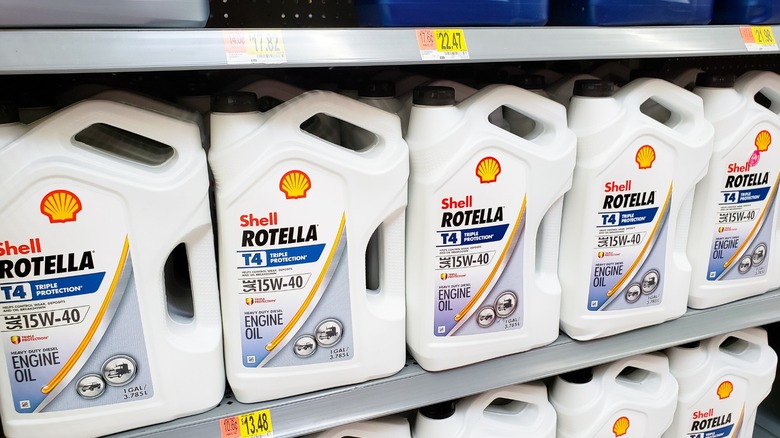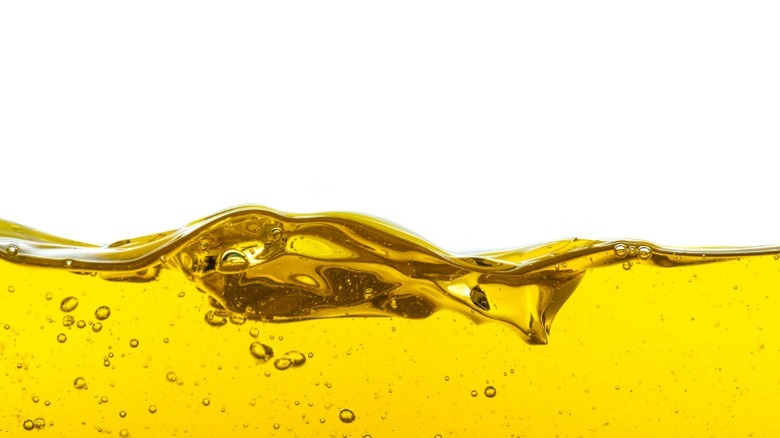Is 15W-40 Oil Only For Diesel Engines?
Oil is a vital component for engines of all types. Not only is it responsible for providing lubrication to numerous moving interior parts, but it also helps prevent friction and the development of dangerous heat levels. However, while all motor oils share a similar purpose, there are many different types and classifications of motor oil, and not all of these variations are appropriate for every engine. Some of the most popular types of oil you're likely to see in modern automotive use include 5W-20, 5W-30, and 0W-20. However, you may see variations as thin as 0W-8 engine oil or as thick as 5W-60. There are oils thicker and thinner than those mentioned, but they are not commonly seen in automotive engine applications.
If you've tinkered on cars for a while or worked in the automotive repair and maintenance industry, you're probably familiar with various common engine oil types. While the popular oils described above are relatively common for gas engines, 15W-40 is a very popular type of oil for diesel vehicles. If you drive a diesel car or truck, there's a good chance your engine relies on this specific type of oil. However, despite the prevalence of its use in diesel engines, 15W-40 engine oil is not diesel engine exclusive.
In reality, 15W-40 oil has a variety of applications, ranging from passenger car and truck engine lubrication to use in heavy-duty mining and construction machinery. If you're interested in learning more about the other types of engines that use 15W-40 oil, we've got you covered. Here's the deal with 15W-40 engine oil.
What makes 15W-40 oil different from other engine oil varieties?
As mentioned, 15W-40 oil has many applications besides its use as a lubricant in diesel engines. However, before we dive into the different types of engines that use 15W-40 oil, it may be helpful to explain what makes this particular oil different from other popular varieties. Engine oil is available in various viscosities or thicknesses. An oil's thickness or viscosity is indicated by its classification or rating, which includes the letter "W" and the other numbers. Different engines have varying internal tolerances and clearances, which, in simplified terms, means that the spaces between parts and the passages through which oil flows can be larger or smaller from one engine to the next. The oil used to lubricate these engines must be able to flow smoothly through those passages and channels without being so thin that it allows friction and heat to develop.
Many modern gas engines are now built with exceptionally tight tolerances and clearances, necessitating the use of increasingly thin engine oils, like 0W-20 and 0W-8. However, heavier-duty engines, like diesels, and older engines, like those found in classic and vintage cars, require a thicker oil. Diesel engines operate at higher temperatures and with greater levels of compression than gas-powered vehicles, making a more viscous oil necessary to protect sensitive components. On the other hand, older cars tend to have larger clearances and tolerances and run-down internal components, making a thicker oil optimal to help lubricate aged, worn-out parts, prevent leaks, and fight against friction.
What other engines use 15W-40 oil, and can you use it in your vehicle?
We touched briefly on some of the other types of engines that use 15W-40 oil above. Modern applications for 15W-40 oil include mainly diesel machinery, ranging from passenger cars and trucks to 18-wheeler semi-trucks and heavy-duty equipment, like farming and mining machinery. However, you can also use 15W-40 in some gas engines. That applies primarily to older engines, such as those in vintage and classic vehicles. As mentioned above, older engines tend to have larger clearances and tolerances than those in modern vehicles. In fact, many vintage cars came off the factory lot with a thicker oil recommendation from the manufacturer. Furthermore, these engines may also have worn-out parts after many years and thousands of miles of use. Using a thicker oil, like 15W-40, can help prevent leaks and provide adequate lubrication to these older engines.
If you're wondering whether you can use 15W-40 oil in your engine, there are a couple of ways to find out. The best and smartest way to determine the correct type of oil to use in any engine is to check your owner's manual. If your car is very old, 15W-40 may even be the recommended oil. There are other scenarios in which you can use a thicker oil, like 15W-40, in place of a thinner one. For example, if the engine is very old and burning lots of thin oil or if you have access to nothing else, you may want to try 15W-40. However, the best course of action is to always follow your manufacturer's instructions when it comes to automotive fluids and the types you should put in your vehicle.


